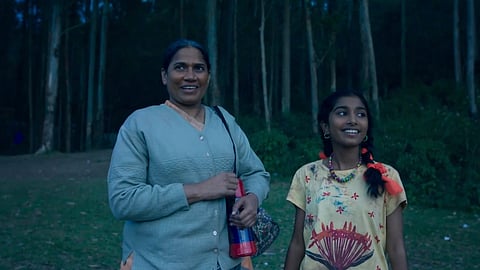Short Film 'Chai-Coffi' Depicts The Quiet Radicalism of A Widow’s Solo Journey
When we speak of a 'solo girl trip' the image that usually comes to mind is of someone young and fierce with a demanding career — a woman stepping away from deadlines and routines to take a breather. What we almost never picture is a 60-year-old homemaker, someone whose life has been lived within the confines of family duty, who has rarely been asked what she wants. Mumbai-based multidisciplinary filmmaker, Sanjoli Malani’s short film Chai-Coffi places that woman at its center, and in doing so, it challenges the narrow ways we imagine autonomy, desire, and agency.
The film follows Lata, a widow, as she travels alone to a tea plantation in Kerala, a place her late husband cherished based on the photograph of a sunset. This journey, seemingly simple, becomes a profound act of self-assertion. For much of her life, Lata’s decisions have been circumscribed by famililial obligations and societal norms, and even in widowhood, she faces judgments about what she 'should' do. Traveling alone, navigating unfamiliar spaces, and reconnecting with her own desires, she begins to confront these limitations. Along the way, her interactions with a young girl, Mira, highlight the contrast between unrestrained youth and the carefully constrained life she has led, offering Lata a glimpse of possibility and freedom she had long been denied.
Chai-Coffi brings these small acts of agency to light like choosing a path, embracing a view, or simply deciding to go on a trip, and how they can have an extraordinary impact for someone who has been socially and emotionally constrained. The film reflects on how societal expectations often subjugate women even in imagination, and how widowhood can compound that social code where they aren't granted an expression of grief and love during loss. At the same time, it also celebrates the rediscovery of personal joy and independence, positioning the reclamation of selfhood as liberation.
Chai-Coffi is careful not to romanticize her struggle. Lata is hesitant, uncomfortable, and often overwhelmed by the very act of traveling on her own. The film gives voice to a kind of woman we rarely see onscreen — the homemaker whose life has been so tightly bound to her family and husband that, once he is gone, she is left unsure of how to exist independently. This is not framed as personal weakness but as the consequence of a system that pushes women to depend so completely on the men in their lives that they are denied the chance to become self-sufficient financially, emotionally, even socially. By dwelling on Lata’s hesitations, the film acknowledges the cost of that stifling, generational conditioning, and brings to light the struggles of women who are too often dismissed as 'simple' and left invisible in society.
Through Lata’s story, the film comments on the invisibility and marginalization of older women in Indian society, the pressure to conform to family-defined roles, and the subtle power of taking control one’s life, even in small ways. The film is a statement on the autonomy and joy, that however modest or delayed, can be revolutionary.
Follow Sanjoli Malani here and watch the short film below:


